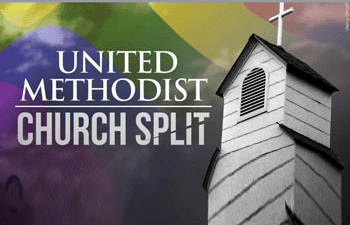06-07-2024 TALIA WISE
The United Methodist Church Council of Bishops has issued a response to one of the largest exoduses from the denomination in history.
More than one million members from the Côte d’Ivoire Conference, based in West Africa, voted last month to leave the group after the UMC voted to allow the ordaining of LGBT clergy and blessing of same-sex unions.
An English translation from this particular African branch stated that the UMC had distanced “itself from the Holy Scriptures” and “was no longer suitable” for the Cote d’Ivoire Conference, according to Crosswalk.
They added that the UMC prefers to “sacrifice its honor and integrity to honor the LGBTQ community.”
In a statement released Wednesday, MC Council of Bishops President Tracy Malone said that although the conference decided to remove the “restrictive language” that previously barred LGBTQ-identifying individuals from leadership it does not force pastors or churches to act contrary to their beliefs.
“While we grieve Cote d’Ivoire Conference’s decision to separate from The United Methodist Church, we commit to work with them through the process of becoming an Autonomous Methodist Church,” she wrote. “While we are not all of one mind in all things, the strength of our connection is love, respect, compassion and a shared commitment to faith in Jesus Christ.”
As CBN News reported, the UMC lifted a nearly 40-year-old ban on ordaining gay clergy in May.
The move came on the heels of a massive departure from U.S.-based churches that no longer wanted to be part of the increasingly liberal denomination.
In the U.S. alone, the UMC lost 7,660 congregations, or about 25% of the group’s churches in the last five years.
Then, in a 692-51 vote, church leaders passed several rules removing the ban on gay clergy and the penalties for holding same-sex marriages, according to United Methodist News Service (UM News).
Progressive congregations have long been pushing to become more accepting of LGBTQ lifestyles, despite biblical prohibitions, leading to deeper divisions and departures.
Many conservative congregations had already left the denomination because, despite the UMC forbidding the marriage or ordination of practicing homosexuals, some churches and clergy have defied those bans in recent years.
Collectively, the UMC has ten million members in Africa, Asia, Europe, and the United States. But other branches in Africa could follow the Cote d’Ivoire Conference’s move.
“The church has aligned with the Rainbow Movement, and this is also a threat to our African traditions and human existence at large,” a petition from the protesters read, according to the Associated Press.
Meanwhile, delegates at the General Conference recently approved the departure of the UMC Eurasian Episcopal Area which has annual conferences in Eastern Europe and Central Asia.
According to UM News, this is a step toward allowing regionalization or allowing global churches to determine their own stance on issues like homosexuality.
